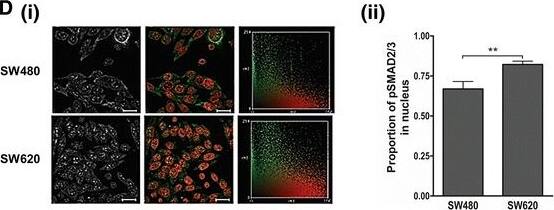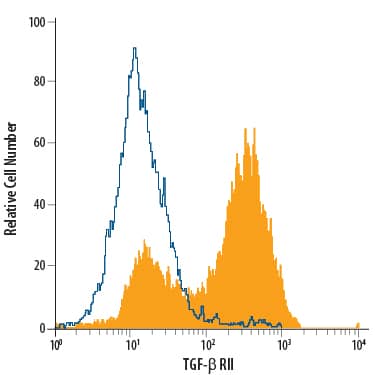Human TGF-beta RII Fluorescein-conjugated Antibody
R&D Systems, part of Bio-Techne | Catalog # FAB241F

Key Product Details
Species Reactivity
Validated:
Cited:
Applications
Validated:
Cited:
Label
Antibody Source
Product Specifications
Immunogen
Ile24-Asp159
Accession # P37173.2
Specificity
Clonality
Host
Isotype
Scientific Data Images for Human TGF-beta RII Fluorescein-conjugated Antibody
Detection of TGF-beta RII in NS0 Mouse Cell Line Transfected with TGF-beta RII by Flow Cytometry.
NS0 mouse myeloma cell line transfected with TGF-beta RII was stained with Mouse Anti-Human TGF-beta RII Fluorescein-conjugated Monoclonal Antibody (Catalog # FAB241F, filled histogram) or isotype control antibody (Catalog # IC002F, open histogram). View our protocol for Staining Membrane-associated Proteins.Detection of Human TGF-beta RII by Immunocytochemistry/Immunofluorescence
Investigating the status of the canonical TGF-beta pathway and levels of Hsp90 in the genetically paired SW480 primary and SW620 secondary tumour-derived colon cancer cell lines. a The secretion of TGF-beta 1 by SW480 and SW620 cells was determined by means of an ELISA to quantify the levels of extracellular TGF-beta 1 in spent culture medium for a given cell number after 12 h incubation. Data represent the average of three independent experiments performed in triplicate and error bars indicate the standard error in the mean. b The levels of TGF-beta RII receptor on the cell surface was determined by flow cytometry using a fluorescein isothiocyanate-conjugated antibody. Data was analysed using FlowJo software and gating carried out according to the IgG1 isotype control. Histograms show a shift in fluorescence for each sample (black line, unshaded) compared to the isotype control (grey shading) and the percentage of positive events is indicated for each sample. Data are representative of three independent experiments showing consistent results. c Intracellular levels of TGF-beta 1 in SW480 and SW620 cells were determined by (i) western blot analysis and compared to a histone loading control. The images are cropped from the full length western blot provided as Additional file 1. (ii) The normalized levels of pre-pro TGF beta1 from the western blot in (i) were determined by densitometry using ImageJ and calculated according the histone loading control. AU: arbitrary units. The positive control represents commercially obtained recombinant human TGF beta1 in its active form. d Activation of the TGF-beta canonical pathway was determined by the phosphorylation and nuclear localization of Smad2/3. SW480 and SW620 cells were stained for pSMAD2/3 and nuclei were stained with Hoescht-33342. Immunofluorescence was detected using the Zeiss LSM 510 Meta laser scanning confocal microscope and the images analysed using Axiovision LE 4.7.1 software (Zeiss). (i) The first column shows the level of pSmad2/3 staining in the cells, pseudocoloured to white, while the second column shows a merged image of the nucleus pseudo-coloured to red and the pSMAD2/3 staining pseudocoloured to green. The third column shows frequency scattergrams obtained using colocalisation analysis on Image J,. Scale bars represent 20 μm. (ii) Graphs generated from profiles of the nucleus and pSMAD2/3 within individual cells analysed using Zen Lite Software showing the proportion of total pSMAD2/3 that is found in the nucleus. In all cases, analyses were performed on triplicate images containing at least 10 cells per image e The secretion of Hsp90 beta by SW480 and SW620 cells was quantified by means of an ELISA on spent culture medium after 12 h incubation. The data are representative of two individual experiments performed in triplicate and showing consistent results. f Whole cell lysates from SW480 and SW620 cells were analysed for Hsp90 alpha and Hsp90 beta expression using western blot analysis. Where relevant, data was analysed using GraphPad Prism 4.03 software with errors bars indicating the standard error in the mean and a students t-test was performed to assess statistical significance. (*p < 0.05, **p < 0.01) Image collected and cropped by CiteAb from the following publication (https://bmccancer.biomedcentral.com/articles/10.1186/s12885-017-3190-z), licensed under a CC-BY license. Not internally tested by R&D Systems.Applications for Human TGF-beta RII Fluorescein-conjugated Antibody
Flow Cytometry
Sample: NS0 mouse myeloma cell line transfected with TGF‑ beta RII
Reviewed Applications
Read 1 review rated 4 using FAB241F in the following applications:
Formulation, Preparation, and Storage
Purification
Formulation
Shipping
Stability & Storage
- 12 months from date of receipt, 2 to 8 °C as supplied.
Background: TGF-beta RII
TGF-beta RII is a membrane bound serine/threonine kinase. Upon ligand binding, TGF-beta RII interacts with TGF-beta RI to form the heteromeric signaling complex that transduces TGF-beta signals. A splice variant of the type II receptor, TGF-beta RIIb, containing a 25 amino acid residue insertion near the N-terminus of the mature protein has also been described.
Long Name
Alternate Names
Gene Symbol
UniProt
Additional TGF-beta RII Products
Product Documents for Human TGF-beta RII Fluorescein-conjugated Antibody
Product Specific Notices for Human TGF-beta RII Fluorescein-conjugated Antibody
For research use only

